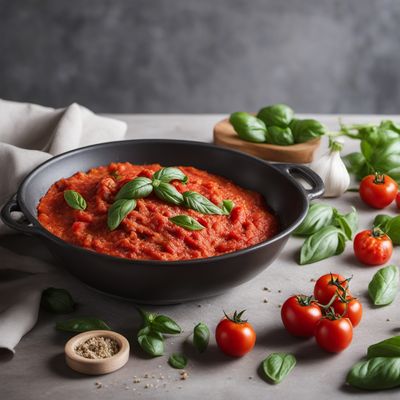
Cuisine
Sicilian cuisine
Sicilian cuisine is characterized by its use of fresh, local ingredients, such as seafood, citrus fruits, and almonds. The cuisine is also known for its bold, complex flavors, which are achieved through the use of spices, such as saffron and cinnamon, and the combination of sweet and savory flavors. Sicilian cuisine is also heavily influenced by the Mediterranean diet, which emphasizes fresh fruits and vegetables, whole grains, and lean proteins.
Typical ingredients
Seafood, Citrus fruits, Almonds, Saffron, Cinnamon, Eggplant, Tomatoes, Olives, Capers, Raisins, Pine nuts
Presentation and garnishing
Sicilian cuisine is often presented in a colorful and vibrant manner, with dishes featuring a variety of textures and flavors. Garnishes are typically bold and flavorful, with fresh herbs and citrus being the most common.
Sicily is home to Mount Etna, one of the most active volcanoes in the world. The volcanic soil of the region is believed to be one of the reasons for the high quality of the local produce.
More cuisines from this region...
Venetian cuisine, Tuscan cuisine, Neapolitan cuisine, Apulian cuisine, Sardinian cuisine, Lombard cuisine, Ligurian cuisine, Roman cuisine, Abruzzese and Molisan cuisine, Basilicatan (Lucanian) cuisine
History
Sicilian cuisine has a long and rich history that dates back to ancient times. The cuisine has been influenced by a variety of cultures, including Greek, Roman, and Arab. The cuisine was also heavily influenced by the Spanish, who ruled Sicily for over two centuries. During this time, the Spanish introduced new ingredients and cooking techniques to the region, which helped to shape the cuisine into what it is today.
Cultural significance
Sicilian cuisine is an important part of the cultural heritage of Sicily. The cuisine is deeply rooted in the traditions and customs of the region, and is an important part of the social fabric of the area. Sicilian cuisine is also known for its association with the Mediterranean diet, which is considered one of the healthiest diets in the world.
Health benefits and considerations
The Mediterranean diet, which is the basis of Sicilian cuisine, has been shown to have numerous health benefits, including reducing the risk of heart disease, stroke, and certain types of cancer. However, some traditional Sicilian dishes can be high in fat and calories, so it is important to enjoy them in moderation.
Sicilian cuisine dishes Browse all »

Lardari al pomodoro
Tomato and Bread Soup
Lardari al pomodoro is a traditional Italian dish that is perfect for those who love pasta. It is made with spaghetti that is cooked in a tomato-based sauce that is flavored...

Sfincione
Sfincione is a traditional Sicilian pizza-like dish that is typically served as a street food or snack. It is a thick, doughy base topped with tomato sauce, onions, anchovies,...

Marallo
Marallo is a traditional Italian dish that is perfect for a hearty meal. It is a combination of pasta, meat, and vegetables that are cooked together to create a delicious and...

Caponata
Eggplant Stew
Caponata is a traditional Sicilian dish made with eggplant, tomatoes, and other vegetables. It is a flavorful and hearty dish that is perfect for a summer day.

Elenia
Elenia is a traditional dish from the island of Cyprus, made with bulgur wheat and vegetables.

Vastedda
Vastedda is a traditional Sicilian sandwich that is made with veal spleen and ricotta cheese.

Carne capuliata
Capuliato Sauce
Carne capuliata is a traditional Italian dish that is perfect for a hearty meal. It is a slow-cooked beef stew that is flavored with a variety of herbs and spices. The dish is...

U' pituni
U' pituni is a traditional Sardinian dish that is made with semolina flour, potatoes, and cheese. The dish is typically served as a main course and is often accompanied by a...
Sicilian cuisine recipes Browse all »

Sicilian Capuliata: A Flavorful Twist on Carne Capuliata
Sicilian Capuliata: A Symphony of Flavors in Every Bite

Sicilian Talo with Tomato and Ricotta
Mediterranean Delight: Sicilian Talo with Tomato and Ricotta

Sicilian Almond Pudding
Delizioso Dolce: Sicilian Almond Pudding

Sicilian Pizzolo with a Twist
Mediterranean Delight: Sicilian Pizzolo with a Burst of Flavors

Sicilian Pachamanca
Sicilian Earthy Delight: A Sicilian Twist on Pachamanca

Sicilian-style Maize Rice
Sicilian Sunshine Rice

Marallo alla Siciliana
Sicilian Delight: Marallo Stew with a Twist

Sicilian Cuccia with Almonds and Chocolate
Decadent Sicilian Delight: Almond and Chocolate Cuccia

Sicilian Pata Soup
Savor the Sicilian Delight: Pata Soup with a Mediterranean Twist

Sicilian-Inspired Braised Beef with Sweet and Sour Sauce
Sicilian Beef Stew: A Tangy Twist on Braised Meat

Sicilian Caldo Santo
Sicilian Seafood Stew: A Taste of the Mediterranean

Sicilian-style Garofolato
Sicilian Delight: A Flavorful Twist on Garofolato